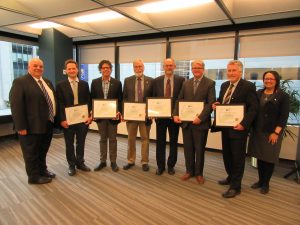
First six people made Infrastructure Resilience Professionals
June 21, 2016
By
CCE

Infrastructure Resilience Professionals receiving their certificates from Kim Allen (at left) from Engineers Canada.
Photo: Engineers Canada.
Engineers Canada has launched a new professional designation for professionals who have competence in designing infrastructure in an era of climate change.
The first six certified “Infrastructure Resilience Professionals” (IRPs) were presented with their certification on June 9 in Ottawa. To become certified they had to complete four training workshops on topics related to engineering and climate change, including climate law, climate science and asset management, and a workshop on the application of the Public Infrastructure Engineering Vulnerability Committee (PIEVC) Protocol.
The PIEVC Protocol is Engineers Canada’s process for engineers and others to identify the risks of climate change in infrastructure and recommend measures to address those vulnerabilities.
The IRP must have completed an infrastructure climate resiliency assessment or been involved in an assessment as a client or owner.
Engineers Canada chief executive officer Kim Allen, P.Eng. said he was proud to present the six individuals with their IRP certifications. “Infrastructure owners and operators, governments and the public can have increased confidence that the recommendations and approvals made by these engineers are supported by advanced training and experience in climate vulnerability assessment, risk management, and climate adaptation.”
Jeanette M. Southwood, the association’s vice-president of strategy and partnerships, said: “With the urgent need to renew aging infrastructure, and with the Canadian government investing billions of dollars in new infrastructure, the demand for engineers trained to assess future climate vulnerability and risks to infrastructure will be high. It is vital that engineers are prepared to participate in and inform decision-making so that our buildings, transportation, energy and water management systems, and other assets can withstand extreme weather events and be ready for how our climate is changing. The new IRP certification does just that.”
Three of the new “IRPs are with consulting engineering companies.
Dr. Guy Félio, P.Eng. Félio is an infrastructure management specialist with RV Anderson Associates in Ottawa. With more than 30 years of experience in the field as a professor, researcher, consultant and policy advisor, he provides expertise in the areas of asset management and climate change vulnerability and adaptation of infrastructure.
Jeff O’Driscoll, P.Eng. O’Driscoll is a division manager with Associated Engineering in WinnipegWith 25 years of experience in consulting engineering and extensive experience in the planning and design of municipal infrastructure, his recent efforts have focussed on assessing the impacts of climate change on infrastructure.
Roger Rempel, FEC, P. Eng. Rempel is the Senior Environmental Engineer with MMM Group, a WSP Company, based in Winnipeg, MB. With over 20 years of experience, he has conducted climate change impact assessments and served as technical advisor on a number of multi-disciplinary teams assessing critical public infrastructure for vulnerability to climate change.
The other IRPs are:
– Brent Burton, P.Eng. Burton is lead senior engineer in the Water Services Department at Metro Vancouver, where he has worked since 2002 on engineering planning activities to support the region’s water and wastewater system. He is also active on local and national committees and groups specializing in climate change adaptation.
– Dirk Nyland , P.Eng. Nyland is the chief engineer with the BC Ministry of Transportation and Infrastructure. He has over 40 years of experience in transportation engineering and has been championing climate change adaptation initiatives for ministry transportation engineering since 2008.
– David Lapp, P.Eng. Lapp is Engineers Canada’s practice sead, globalization and sustainable development and has worked in the area of climate change adaptation and engineering since 2001. He has been instrumental in developing and growing the PIEVC protocol and creating the IRP certification.